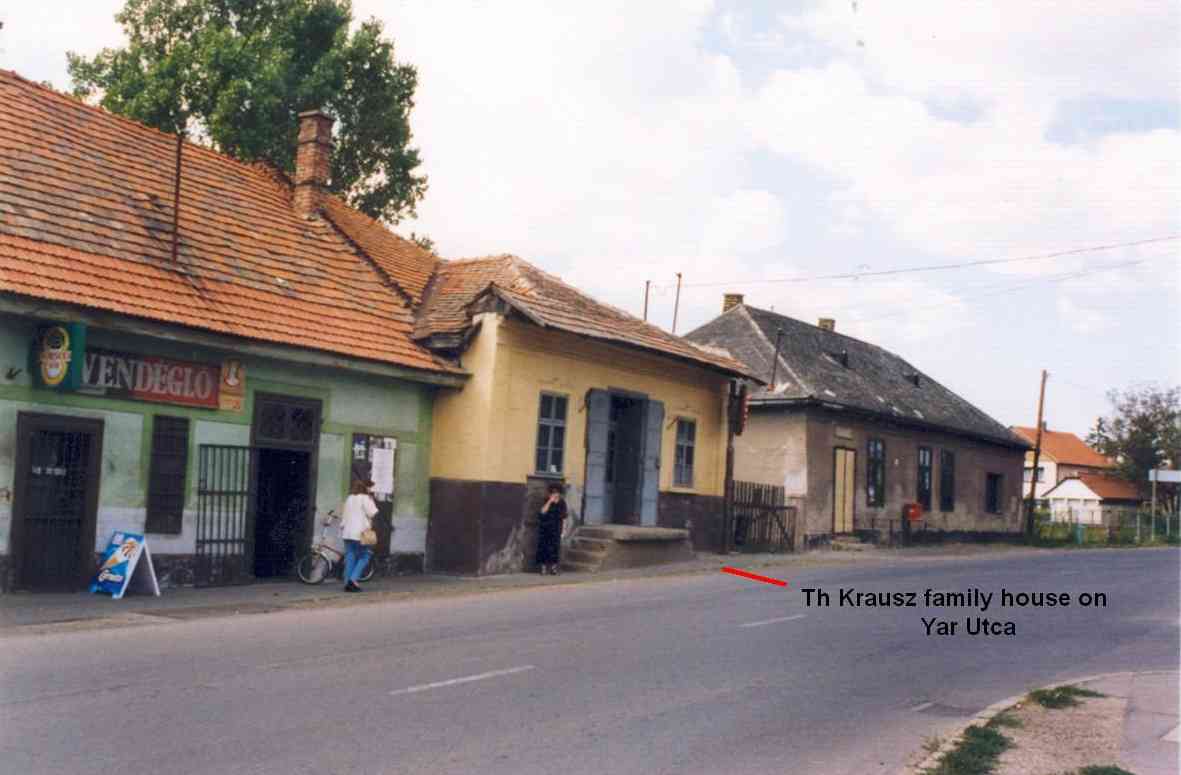| District: Borsod 14 miles N of Miskolc 94.3 miles NE of Budapest | 48°18' N, 20°44' E |
The Krausz Family |
Slide Show Controls
 |
The Edelény Krausz family ran a bustling construction and building materials enterprise in town. Yehoshua and Malka Krausz had four children, Shmuel, Lillian (Chaya), Aaron Meyer and Devorah (Alice). Chaya married before the war to Gabriel Mezei and had two children. Yehoshua’s father came from nearby Miskolc, Mordechai Krausz. The family traces its lineage back to Reb Shmuel Krausz of Vagas. The idyllic life in bucolic Edelény shattered forever with the advent of Hitler, but was not ever forgotten to Aaron Meyer as he recalls with nostalgia their home on the main street, to which the family construction business holdings was attached. A pivotal memory is that of his bar mitzvah, celebrated on the side porch and attended by the town, plus luminaries such as Rav Israel Abraham Alter Landau. Also, Aaron Meyer fondly remembers there were a river, the Bodva Foyo and the patak [stream or brook] flowing nearby, where the neighborhood kids used to gather and swim in the deep channel that was dug by WWI prisoners of war. The families in town were all close, and the children attended state sponsored school together in the mornings, and the boys continued with Cheder in the Synagogue from 1pm until 7 pm. Aaron showed a lot of promise in Cheder, and as a young prodigy he was the youngest ever student to be accepted into the Yeshiva at eleven and a half years old where he studied together with twenty years old talmudim. Already in 1939 dark clouds developed marring the serenity of Edelény. An anti Semitic mayor closed the Yeshiva. Aaron Meyer initially continued studying at home with his older brother Shmuel under their father’s tutelage. After a hard days work, his father rigorously tested the boys each evening to see what they had learned. However, in 1941 Aaron Meyer left home to learn at the famous Munkacher Yeshiva. Life in town was simple. Everyone had two outfits, one for the weekday, and one for Shabbat. During the week the boys wore a cap, and on Shabbat Aaron wore a round fedora hat. Girls went to state sponsored school till twelve years old, and then they stayed home and learned sewing, cooking and housework. The main business in Edelény was the coal mine that was owned by the Horowitz Margarreten family from the United States and donated to the rabbi to sustain the town. However, soon all Jewish business licenses were revoked and life for Jews in Edelény became precarious and harsh. Malka fell critically ill a few years after the birth of her fourth child and passed away in 1942, a day after the grand Rebbe Israel Abraham Alter Landau. It is said that while he lived, he had kept her alive for an additional sixteen years with his prayers. Not long after, everything came to an end as the town’s inhabitants were deported, shattering the fabric of this unique friendly town. By 1944 there were no Jews left in town. After the war, most of the Edelény Jews had perished. Surviving the churban [catastrophe], Aaron Meyer married Leah Citron, the daughter of Rabbi Joseph Czitron of Hajudubosormèny and later Sopron and Budapest, under whose guidance Aaron Meyer obtained rabbinical ordination and was hired to fill the Sopron pulpit. Their lives were saturated with miracles, and only through the grace of Hashem, they were able to escape sure death in the1956 revolution as they were stopped trying to cross the border. With much difficulty, trials, and tribulations, Rav Aaron and Leah managed to make it to Australia with their two little children, Shmuel and Malka. Soon after, a third child, Chaya Rivka was born. Rav Krausz ultimately obtained a leading pulpit in Sydney. Eventually the whole family immigrated to the United States. Today, Rav Aaron Meyer Krausz and his wife Leah live an active life in the vibrant Jewish community of Monsey, New York and are the proud grandparents to many grandchildren and great grandchildren. The unique Edelény fraternal spirit continues to burn bright, and it is with much gratitude to the children of Lichtig and Mogyoros families that the story of bucolic Edelény is being revived and will be immortalized for future generations. Ironically, this holy Jewish community is subject of similar rebirth in Monsey, N.Y. as the namesake and grandchild of the grand Rabbi Israel Alter Landau is building a magnificent synagogue in Monsey for Edelény congregants to ensure that Jewish Edelény never perishes. 1From the oral testimony of her father, Rabbi Aaron Meyer Krausz |